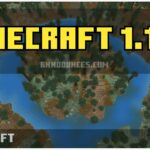Minecraft Forge is an API created in July 2011 by Spacetoad, and allows users to easily install many mods on Minecraft while avoiding incompatibilities as much as possible. It also provides modders with many features to deeply modify Minecraft.
History of Minecraft Forge :
At that time, mods mainly worked with ModLoader, and server mods also needed ModloaderMP.
Some mods directly modified the Minecraft code: they are called “vanilla mods” (they still exist, not to be confused with no mods using command blocks) their main disadvantage is that they are very rarely compatible with each other.
Modloader thus allowed to install several mods at the same time without too many compatibility problems. However, for Buildcraft version 2.0, Spacetoad wanted to add a new liquid in the mod: oil.
For this feature to be implemented, Spacetoad had no choice: it had to directly modify the Minecraft bucket code (in the Minecraft bucket code, there’s a function that if you right-click on it and point to water, then the water is removed and the empty bucket is replaced by a bucket of water, same for lava. This is where Spacetoad should have added a code that does the same thing with oil).
So he was faced with the following problem: if another mod adds fluid in the same way, the last installed mod will cancel the modifications of the other one, or even worse it will crash the game. So they won’t be compatible.
To solve this problem Spacetoad created Forge. Rather than each mod modifies the Minecraft files and thus finds itself incompatible, it is Forge which will be in charge of modifying these files and adding functions allowing the mod to do what it wanted to do without modifying these files.
Thanks to Forge, mods have been able to add more and more complex features to the game without being incompatible with each other. Pretty soon Eloraam (creator of the redpower mod, the old ones surely know this mod) joined the project and added a lot of necessary functionality for his red power mod.
Afterward, Spacetoad didn’t have time to take care of the project anymore and so gave hand to LexManos. LexManos was later joined by cpw who created FML (Forge Mod Loader) to replace Modloader and ModloaderMP with a more modern solution.
Indeed until the beginning of version 1.2.5, Forge was always dependent on Modloader and ModloaderMP. So there were several things to install, it was not as simple as now. Forge is just a huge library of functions for modders but didn’t load mods.
The latest versions of Forge 1.2.5 were no longer dependent on Modloader & ModloaderMP but on FML which was integrated directly into Forge. Recently (last year), Forge and FML have been merged into a single project. However, we can still see in the mods menu that there are two distinct parts. From the mods menu of Forge, you can also see a mod named MCP. It’s not really a mod but the tool used to create mods.
Thanks to these different evolutions, Forge is now very easy to install since you just have to run its automatic installer. At the time it was necessary to open the jar of Minecraft with an extraction software and replace some Minecraft files by Modloader files, then by those of ModloaderMP then finally by those of Forge… A complex installation that took time.
Over time Forge has become more and more complete. The project being open source, any modder can propose a new feature. Here are some features of Forge useful for the user:
- The update verification system: If you see an emerald to the right of the “mods” button on the main menu, it means an update is available. Just go to the mod menu to see which one has an update, click on the mod link and then download and install the latest version of the mod
- Dependency management: Modders can very easily tell Forge that one of their mods depends on another mod. So if the user installs a mod without installing the mod they depend on, Forge will clearly indicate the problem instead of giving a crash report that is incomprehensible to most people.
- Automatic ids management: Many Minecraft items work with an id (blocks, items, potion effects, enchantments…). This identifier must of course be unique since it is what allows to differentiate two blocks from each other, idem for items, etc… These ids have always been a problem because if two mods add a block with the same id the game can’t differentiate them and therefore crash. For a long time the solution has been to change the id in the mod’s configuration file in case of conflict, but this is really not practical. Since 1.7.10, Mojang added a new thing to Minecraft: a registry. It’s a new system to identify blocks and items based on the name. However, registering a name on the map would make maps very heavy, so ids (which are numbers) are still used. cpw has therefore implemented in Forge a new system for mods. Now when a block is registered, only a name is registered. Then when a new map is created, and the available id is automatically assigned to each name. This new system allows us to avoid id conflicts without exploding the size of the map. Since version 1.9 of Minecraft, the registry manages potion effects and enchantments in addition to blocks and items, thus avoiding the user to spend hours dealing with compatibility issues.
Download Minecraft Forge :
| Version Forge | .exe | .jar | Update |
| Minecraft 1.16.1 (32.0.18 – Latest Version) | Unavailable | Download | 26/06/2020 |
| Minecraft 1.15.2 (31.2.21) | Unavailable | Download | 20/06/2020 |
| Minecraft 1.15.2 (31.2.0 – Version Stable) | Unavailable | Download | 15/05/2020 |
| Minecraft 1.15.1 (30.0.41 ) | Unavailable | Download | 16/01/2020 |
| Minecraft 1.15 (29.0.4 ) | Unavailable | Download | 18/12/2019 |
| Minecraft 1.14.4 (28.2.0 – Version Stable) | Unavailable | Download | 03/02/2020 |
| Minecraft 1.14.3 (27.0.60) | Unavailable | Download | 16/07/2019 |
| Minecraft 1.14.2 (26.0.63) | Unavailable | Download | 26/06/2019 |
| Minecraft 1.13.2 (25.0.219) | Unavailable | Download | 21/05/2019 |
| Minecraft 1.12.2 (14.23.5.2847) | Download | Download | 03/09/2019 |
| Minecraft 1.12.1 (14.22.1.2485) | Download | Download | 05/09/2017 |
| Minecraft 1.12 (14.21.1.2443) | Download | Download | 30/07/2017 |
| Minecraft 1.11.2 (13.20.1.2588) | Download | Download | 11/12/2018 |
| Minecraft 1.11 (13.19.1.2199) | Download | Download | 23/12/2016 |
| Minecraft 1.10.2 (12.18.3.2511) | Download | Download | 25/10/2017 |
| Minecraft 1.10 (12.18.0.2000) | Download | Download | 26/06/2016 |
| Minecraft 1.9.4 (12.17.0.2051) | Download | Download | 25/10/2017 |
| Minecraft 1.9 (12.16.1.1887) | Download | Download | 06/01/2016 |
| Minecraft 1.8.9 (11.15.1.2318) | Download | Download | 08/06/2017 |
| Minecraft 1.8.8 (11.15.0.1655) | Download | Download | 29/12/2015 |
| Minecraft 1.8 (11.14.4.1577) | Download | Download | 22/11/2015 |
| Minecraft 1.7.10 (10.13.4.1614) | Download | Download | 11/10/2017 |
Forge in a stable version for Minecraft 1.15.2 :
Find in the tab below the changelog of the last stable version of Forge for 1.15.2. We advise you to install the 1.15 mods with this version to avoid compatibility problems as much as possible.
Install Minecraft Forge :
Once you have downloaded the version of Forge you want from the table above, you will get an executable file.
- Click on the executable file, a window will open indicating whether you want to install the client version or the server version.
- If you want to install Forge on a solo game, select client, if it’s for a server, choose server. Then click OK to complete the installation.
- Now launch your Minecraft launcher. At the bottom left, select the profile that contains the Forge version you have installed. Then just click on Play and Minecraft will load the API files.
-
- Developers: Lexmanos, cpw, Fry

-
- Minecraft version: 1.7.10, 1.8.9, 1.9.4, 1.10.2, 1.11, 1.11.2, 1.12, 1.12.1, 1.12.2, 1.13.2, 1.14.4, 1.15.2, 1.16.1

-
- Mod version: 32.0.18

